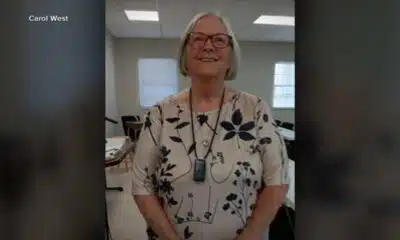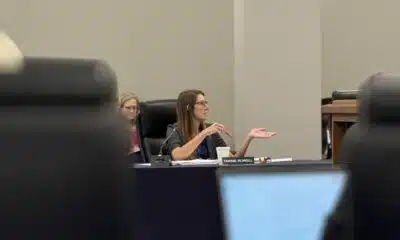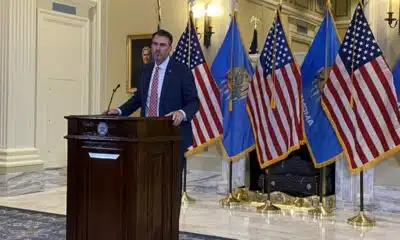News from the South - Texas News Feed
Texas health officials analyze lessons of measles outbreak
“Better testing, less vaccine messaging among lessons learned from historic Texas measles outbreak” was first published by The Texas Tribune, a nonprofit, nonpartisan media organization that informs Texans — and engages with them — about public policy, politics, government and statewide issues.
Sign up for The Brief, The Texas Tribune’s daily newsletter that keeps readers up to speed on the most essential Texas news.
As the number of Texas measles cases tied to a West Texas outbreak slows to a trickle, South Plains public health director Zach Holbrooks remembers the call from a colleague in an adjacent county six months ago that would change both his — and the state’s — entire 2025.
“Katherine was the first person to let me know there was a case,” said Holbrooks, referring to Lubbock’s public health director, Katherine Wells. A Mennonite child from Seminole’s Gaines County — one of four counties under Holbrooks’ charge — had been hospitalized in Lubbock with measles. “So that’s what got the communication rolling between me and Katherine and the state.”
From that first case reported on Jan. 29, the outbreak in West Texas would make up the largest single cluster of measles cases since the virus was declared eliminated in the United States in 2000, killing two and spreading to multiple states. As of this week, 762 people have been infected, shattering the previous U.S. record from 2019, when an outbreak among the Orthodox Jewish community in New York City resulted in 649 cases. Nationwide, the United States is suffering its worst measles outbreak in nearly three decades with the West Texas outbreak making up more than half of the 1,309 cases nationwide.
While it’s been more than a month since a new case has been reported in Gaines County, cases traced back to West Texas continue to be reported across the state in East Texas’ Lamar and Fannin counties, where this week saw the addition of nine new cases.
Technically, Gaines and Lubbock counties are no longer considered active outbreak counties. The spread here seems to have run its course. “They either got the vaccine, the booster or the real thing,” said Dr. Wendell Parkey, chief of staff of Seminole Memorial Hospital.
But as the region catches its breath and wait for the entire outbreak to end, health professionals like Holbrooks, Wells and Parkey, as well as the Texas Department of State Health Services (DSHS), have all been considering what worked and what could be improved after working the first real infectious disease test, post COVID-19.
Their answers included better reporting of cases at the patient level, more help with streamlining the testing process at the start and surprisingly, a more balanced treatment approach that was not solely fixated on vaccination.
As of Friday, DSHS has spent more than $10.6 million in outreach, testing and resource support to the region.
How the West Texas outbreak posed significant challenges
After that first fateful phone call in late January between Wells and Holbrooks, the two looked not to the 2019 New York City outbreak as a guide in how to respond, but to an outbreak that occurred five years earlier, in Ohio.
They both pored over a New England Journal of Medicine article that detailed how that 2014 outbreak impacted a largely unvaccinated Amish population but was mostly contained from spreading. In that case, two unvaccinated men who had traveled to the Philippines to perform relief work had returned to their community with measles. Eventually the outbreak would spread to 383 residents over nine counties before being declared over four months later. Like the West Texas outbreak, about 90% of those infected in Ohio were unvaccinated.
“I kind of wanted to just wrap my mind around how long, what kind of response are we going to be looking at?” Holbrooks said.
Surprisingly, the bulk of the spread in Texas occurred in a four month period, also.
That timespan and the fact that Ohio’s involved a branch of Anabaptists, a 16th century Christian movement that believes strongly in separation of church and state, was helpful to Holbrooks. He grew up in Seminole, home to a large population of Mennonites, also a part of the Anabaptist denomination.
Both Amish and Mennonite communities have no formal opposition to vaccination but many of their followers are unvaccinated, prompting Holbrooks to immediately seek out community leaders to help spread the word about the outbreak and that vaccination was the best weapon to keep measles from spreading.
While the Ohio outbreak seemed a better comparison than the New York one because it occurred outside a large metro area, there were sharp differences between the 2014 cluster and that in Gaines, underscoring the unique challenges Texas health officials and beyond were up against.
In Ohio, most measles cases were located in areas that reported an overall 95% vaccination, enough to ensure herd immunity. More importantly, the Ohio outbreak had occurred before the coronavirus pandemic, years before vaccination fatigue from a global pandemic set in.
By comparison, Gaines County’s vaccination rate had dropped far below the herd immunity level, to 82% and the number of seventh graders who had filed a conscientious exemption for at least one vaccination with local schools, had grown from 2% in 2014, long before COVID-19,of seventh graders had a vaccination exemption. In 2024, it was nearly 20%.
The Texas outbreak also involved a more mobile population. Seminole in Gaines County is located 35 miles from New Mexico and involved a largely unvaccinated population that traveled often long distances: to Mennonite communities in Mexico and Canada as well as those located in northeastern Texas.
Their penchant for traveling made it harder for public officials to contain the spread, which eventually would lead to cases in Oklahoma, New Mexico, Kansas, Illinois, Colorado and Mexico.
Undercounting of measles cases
To better track the spread and stop it, the state has worked with local providers and health departments to carefully document exactly how many measles infections occur. To do that, public health officials rely on local providers and hospitals to inform them when there is a case.
However, that number is likely an undercount because it is based on patients treated, not those who ride out the virus from their homes.
Statistically, up to three measles cases per every 1,000 measles results in death. Gaines had two deaths, which would indicate the number of infections were far greater than the 441 reported.
“Not everybody who gets sick goes to the hospital,” Holbrooks said.
Among the more popular places for infected Mennonites to seek out health care was with Lubbock physician Ben Edwards, who treated hundreds of patients in a temporary clinic in Seminole. The Mennonite’s skepticism of mainstream medicine elevated Edwards — who denounced vaccines and promoted vitamin A and budesonide, something more commonly used to treat asthma, as alternative prevention and treatment options — to a medical hero for the religious community.
While the local hospital in Seminole regularly reported to Holbrooks’ office every measles patient it treated, information from local providers, such as Edwards, was tougher to come by.
“It was frustrating,” Holbrooks said.
Reporting cases quickly to local health authorities helps them respond more quickly to keep disease from spreading, as well as to keep cases from becoming more serious where hospitalization is necessary.
Emails obtained by The Texas Tribune through a public information request hint at how Holbrooks’ office had to spend extra time retrieving that information from Edwards, who like all physicians are to report “immediately” to local or regional health officials measles cases.
“I’ve seen multiple news reports indicating that your clinic in Seminole has treated upwards of 300 individuals for measles in Gaines County,” Holbrooks wrote Edwards in an April 14 letter, three months after the first measles case. “After reviewing our records, we have not received any corresponding case reports from your office.”
Eventually Holbrooks’ office received a list of patient names and their dates of birth but few other details. Edward apologized for the lateness, attributing it to a communication error with a community translator who was assisting him with patients.
“She and I had a miscommunication, as I had instructed her to send that list to the local health authority but she thought I had sent it,” Edwards told the Tribune. “Once I was made aware of this oversight, it was immediately corrected.”
Lessons learned
Public health officials’ measles messaging focused on getting the word out on vaccination.
Once he reached out to community leaders, Holbrooks worked to get public health messaging aired in both English and the Mennonites’ dialect of informal or Low German.
Holbrooks had wanted to put more vaccination and field clinics closer to the Mennonites but quickly saw that doing so would attract too much attention. News of the outbreak brought a sudden influx of national reporters to tiny Seminole, forcing many locals to shy away from pop-up vaccination clinics where TV cameras and photographers were stationed.
Eventually, Seminole health workers moved to a drive-through vaccination clinic through their local show barn, a local livestock exhibition facility used by youth groups, allowing more privacy for those interested in obtaining a measles-mumps-rubella or MMR vaccine.
Even 75 miles north in Lubbock, Wells, the city’s public health director, found that public vaccination spots, while often a hallmark of back-to-school events in August, were not as big a draw in the larger city.
Both she and Holbrooks recognized later that focusing on vaccination from the start could have sent a message that vaccines were the only option for treatment, possibly dissuading more susceptible residents or those with milder measles cases from asking questions or getting more help.
“We should have one more of a treatment clinic [model] and had more boots on the ground, working with churches … to engage better with the Mennonite community,” Wells said.
These vaccine clinics could have been made less clinical and paired with other options, such as checking oxygen levels and passing out Pedialyte to help infected patients stay hydrated.
Such an approach could have invited more visitors and conversation, resulting in better triaging of residents and letting them know to seek more help from the local hospitals, Wells said.
“We should have found a way to set up something that was free, kind of caring for people with measles, not saying you’re like this infectious person,” Wells said.
From inside Seminole Memorial Hospital, Parkey said his facility was fending for itself as measles cases began arriving in force in February and March.
He would have liked more outreach to the private medical care sector from state and local public health officials.
“We couldn’t stop seeing people. Someone could [have] come out and talk to us,” Parkey said, adding that his experience with public health during COVID was similar. “No one talked to me.”
He wished he had more help with offering faster test results to patients. Most hospitals either contracted with local testing labs or sent patient samples for testing in the state’s lab in Austin.
Parkey said the emphasis at the start of the outbreak on vaccines didn’t change minds, especially among his Mennonite patients and he believes it may have hardened the vaccine skepticism of many. In both measles-related deaths, anti-vaccine outfits like Children’s Health Defense stoked doubt about whether the virus was the cause of the children’s fatalities or if it was something else.
The group’s founder, current U.S. Health and Human Services Secretary Robert F. Kennedy Jr. came to Seminole after the death of a second child and met with Mennonite families. Although Kennedy is no longer with the group, his history of false statements about vaccines together with that personal visit reinforced for many the view that the government should stay out of individual health decisions particularly related to vaccines..
“Anywhere you have a bunch of people who don’t believe in vaccines, you’re going to see it,” he said of downplaying measles.
Wells admits that one of the lessons from COVID is that public health officials had a hard time learning to bend and pivot quickly in reaction to both the ever-morphing virus and the growing knowledge about who was at the greatest risk. By not communicating effectively and immediately when restrictions and advice changed, the public felt a constant whiplash of conflicting information and quickly began tuning out medical updates and vaccination alerts.
As the number of measles cases began to taper in April and May, so did the messaging, a sign perhaps that public health is learning to pivot more quickly to a community’s reaction to an outbreak.
Vaccination was — and is still — touted as the best preventive measure against becoming infected by local and state public health officials. But, by early April, three days after Kennedy’s Seminole visit, the state health agency posted guidance about vitamin A dosage in response to requests from infected residents for ways to ease symptoms.
“We kind of shifted to harm reduction,” said Chris Van Deusen, spokesperson for the Texas Department of State Health Services. “We always want to give the message that’s going to do the most good to people. If that means vaccination messaging takes a back seat, then we have to adapt.”
The lineup for The Texas Tribune Festival continues to grow! Be there when all-star leaders, innovators and newsmakers take the stage in downtown Austin, Nov. 13–15. The newest additions include comedian, actor and writer John Mulaney; Dallas mayor Eric Johnson; U.S. Sen. Amy Klobuchar, D-Minnesota; New York Media Editor-at-Large Kara Swisher; and U.S. Rep. Veronica Escobar, D-El Paso. Get your tickets today!
TribFest 2025 is presented by JPMorganChase.
This article originally appeared in The Texas Tribune at https://www.texastribune.org/2025/07/21/texas-measles-outbreak-lessons-learned/.
The Texas Tribune is a member-supported, nonpartisan newsroom informing and engaging Texans on state politics and policy. Learn more at texastribune.org.
The post Texas health officials analyze lessons of measles outbreak appeared first on feeds.texastribune.org
Note: The following A.I. based commentary is not part of the original article, reproduced above, but is offered in the hopes that it will promote greater media literacy and critical thinking, by making any potential bias more visible to the reader –Staff Editor.
Political Bias Rating: Center-Left
This article by *The Texas Tribune* provides detailed, well-researched coverage of the 2025 West Texas measles outbreak, focusing on public health responses, community dynamics, and vaccine messaging. While the reporting is largely factual and balanced, the framing reflects a Center-Left perspective through its implicit support for public health initiatives, concern over vaccine skepticism, and critique of alternative medicine practices. Additionally, the mention of Robert F. Kennedy Jr.’s role in vaccine misinformation is framed critically. The inclusion of government officials and medical experts as credible sources reinforces a pro-institutional, pro-science tone often associated with Center-Left journalism.
News from the South - Texas News Feed
Houston Texans QB C.J. Stroud on Austin, faith, mentorship and this NFL season
SUMMARY: Houston Texans quarterback C.J. Stroud, a promising NFL talent and Ohio State alumnus, visited Austin’s C4 Nutrabolt headquarters to film a C4 Energy video. His partnership with C4 began in college, and he values the brand’s community involvement. Stroud, who spends time in Austin due to his agent and charity events, appreciates the city’s nature and local spots like The Guest House and lakes. A man of faith, he credits spirituality and mentorship for his growth, encouraging young athletes to embrace failure and be authentic. Focused on personal improvement heading into the new season, Stroud feels grateful for his Houston home and C4 partnership.
The post Houston Texans QB C.J. Stroud on Austin, faith, mentorship and this NFL season appeared first on www.kxan.com
News from the South - Texas News Feed
NY AG steps into legal fight over abortion pills, shield law
“NY attorney general will intervene in Texas abortion pill access lawsuit” was first published by The Texas Tribune, a nonprofit, nonpartisan media organization that informs Texans — and engages with them — about public policy, politics, government and statewide issues.
Sign up for The Brief, The Texas Tribune’s daily newsletter that keeps readers up to speed on the most essential Texas news.
New York Attorney General Letitia James on Monday said she will intervene in a legal fight over Texas’ ban on abortion pills, escalating a national showdown between states that have restricted abortion access and others that are defending practitioners who offer services to out-of-state women.
Her decision came over a month after Texas Attorney General Ken Paxton sued a New York county clerk for refusing to file a six-figure judgment against a doctor accused of prescribing abortion drugs to a Texas woman. This continues a legal battle over shield laws that experts say will likely reach the U.S. Supreme Court.
“I am stepping in to defend the integrity of our laws and our courts against this blatant overreach,” James said in a news release. “Texas has no authority in New York, and no power to impose its cruel abortion ban here.”
In a statement to The Texas Tribune, Paxton called the New York attorney general “a lawless abortionist” and said that he will defeat her in court.
The legal fight first started in December 2024 when Paxton sued Dr. Margaret Carpenter, accusing her of mailing abortion pills from New York to a woman in Collin County in violation of Texas law. Carpenter is the co-founder of the Abortion Coalition for Telemedicine, which helps abortion providers in states with so-called shield laws.
Shield law protections, which exist in over 20 states, seek to legally protect health care professionals and others who provide abortion-related services to those who live in states with abortion bans.
In February, a Collin County judge ordered the New York doctor to stop providing abortion pills to Texans and to pay more than $113,000 in penalties and fees.
Acting Ulster County Clerk Taylor Bruck refused to file the judgment in March and cited his state’s shield law, which was passed in 2023 following the overturn of Roe v. Wade.
Bruck again rejected a second Texas attempt to enforce the judgment in July.
Paxton then sued the clerk later that month in Ulster County. His office also argued in a court document that New York’s shield law violates the U.S. Constitution’s full faith and credit clause, which requires states to respect other states’ “public acts, records, and judicial proceedings.”
“No matter where [Carpenter] hides, our pro-life laws will be enforced, and justice will be served,” Paxton said Monday. “The Constitution expressly requires states to recognize the judicial enactments of other states’ courts, and New York, unsurprisingly, is choosing to ignore that constitutional requirement.”
James said she will submit a legal filing later this month to argue that New York has the legal right to safeguard its residents and courts against “out-of-state overreach.” She said Monday that she has formally notified the case’s judge of that decision.
“Our shield law exists to protect New Yorkers from out-of-state extremists, and New York will always stand strong as a safe haven for health care and freedom of choice,” she said in the news release.
Besides this legal fight with New York, Paxton has joined over a dozen other attorneys general from Republican-led states in July in calling on Congress to take action against abortion shield laws. They similarly argued that such laws infringe on the Constitution’s full faith and credit clause and the extradition clause.
The Texas Legislature also just advanced a bill allowing private residents to sue anyone who manufactures or distributes abortion drugs to or from the state. Gov. Greg Abbott has yet to take action on the legislation passed during the second special session.
Shape the future of Texas at the 15th annual Texas Tribune Festival, happening Nov. 13–15 in downtown Austin! We bring together Texas’ most inspiring thinkers, leaders and innovators to discuss the issues that matter to you. Get tickets now and join us this November.
TribFest 2025 is presented by JPMorganChase.
This article originally appeared in The Texas Tribune at https://www.texastribune.org/2025/09/08/exas-new-york-abortion-pill-access-lawsuit-shield-law/.
The Texas Tribune is a member-supported, nonpartisan newsroom informing and engaging Texans on state politics and policy. Learn more at texastribune.org.
The post NY AG steps into legal fight over abortion pills, shield law appeared first on feeds.texastribune.org
Note: The following A.I. based commentary is not part of the original article, reproduced above, but is offered in the hopes that it will promote greater media literacy and critical thinking, by making any potential bias more visible to the reader –Staff Editor.
Political Bias Rating: Center-Left
This article is framed with a neutral to center-left leaning perspective. It reports on a contentious legal battle over abortion pill access, highlighting actions taken by Democratic New York Attorney General Letitia James and Texas Republican Attorney General Ken Paxton. The article gives considerable attention to New York’s shield law protections and frames Texas’ abortion restrictions as “cruel” and an “overreach,” reflecting language often used in progressive discourse supporting abortion rights. However, it also fairly includes perspectives and legal actions from conservative actors, maintaining an overall factual tone typical of center-left news outlets focused on issues of reproductive rights and state-level legal conflicts.
News from the South - Texas News Feed
Ariana Grande, Lady Gaga shine at MTV VMAs with wins and performances
SUMMARY: At the 2025 MTV Video Music Awards, Ariana Grande won Video of the Year and Best Pop Video, thanking “therapists and gay people” in her speech. Lady Gaga, the top nominee, won Artist of the Year and performed at Madison Square Garden, emphasizing the deep meaning of artistry. Mariah Carey received the Video Vanguard Award with a medley of hits, while a tribute celebrated the late Ozzy Osbourne with performances by rock legends. Busta Rhymes earned the inaugural Rock the Bells Visionary Award, and Ricky Martin received the first Latin Icon Award. Hosted by LL Cool J, the show featured performances by Doja Cat, Post Malone, Taylor Swift, and more, broadcast on CBS for the first time.
The post Ariana Grande, Lady Gaga shine at MTV VMAs with wins and performances appeared first on www.kxan.com
-
Mississippi Today6 days ago
Brandon residents want answers, guarantees about data center
-
News from the South - Texas News Feed5 days ago
Texas high school football scores for Thursday, Sept. 4
-
Our Mississippi Home6 days ago
Southern Miss Faculty and Student Contribute to Groundbreaking NOAA-Funded Plastic Cleanup
-
News from the South - Oklahoma News Feed7 days ago
Family sues Roblox, accusing them of failing to protect kids from predators
-
The Conversation6 days ago
AI is transforming weather forecasting − and that could be a game changer for farmers around the world
-
Mississippi News Video7 days ago
Hattiesburg Fire Department to implement new alert system
-
News from the South - Arkansas News Feed7 days ago
Arkansas correction division to enter settlement over disability law violations
-
News from the South - Oklahoma News Feed7 days ago
Thousands of State Employees Still Working Remotely









































